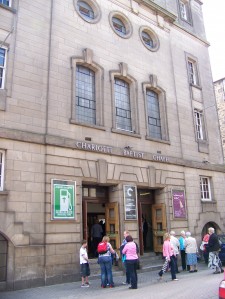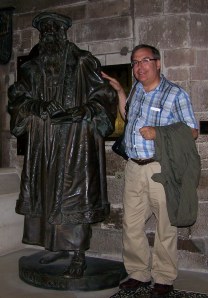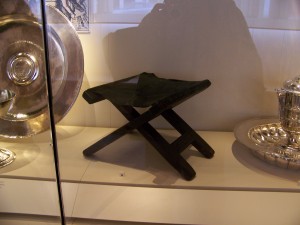I’m writing this somewhere over the North Atlantic. I had hoped to get another post out before we left, but ran out of time (and energy.) Our time in Scotland has been amazing. From taking a quick tour to the highlands, to walking around the interesting city of Edinburgh, to visiting sites rich with revival and reformation history, we have enjoyed every minute and are scheming on a way to come back before too long (anyone interested in a reformation tour hosted by yours truly in 2012? It can be arranged.)
Sunday morning we attended worship at Charlotte Chapel in Edinburgh. This chapel has seen several moves of God’s reviving Spirit in its 200 year existence – in 1808, 1859 and then during the world-wide awakening in 1906-08. It is still a center of strong expositional preaching with a strong emphasis on evangelism. The morning we were there we witnessed a baptism in which the young man gave a wonderful testimony of how God drew him to Christ over a period of years. It was a strong witness to God’s grace and sovereignty in the work of salvation.
That evening we attended St. Columba’s Free Church. The Free Church of Scotland came out of the established church in 1843 over concerns over government interference in the life of the church.
The primary issue was the right of the congregation (rather than the laird) to appoint the pastor of the church. The Free Church is marked by simplicity and the centrality of the Word. This is reflected both in the building and in worship. The building did not have stained glass or ornamentation, the focus of the congregation is fixed on the pulpit from which the Word is read and proclaimed. The worship consisted of singing, Bible exposition and prayer. There is no instrumental accompaniment in the Free Church, worship is led by a precentor and consists solely of singing the psalms. This was the practice of Presbyterian Churches for the first 200 – 300 of our history, and though I would not want to go back to it, there is something powerful about singing God’s inspired Word back to Him in praise.
On Monday I had a half-day reformation tour in Edinburgh. The focus of the tour was on the Covenanters who, in many ways, represented the second reformation in Scotland. The short story is this: the “first reformation” came in the mid-sixteenth centuries when the church in Scotland broke from Rome. Under John Knox and other faithful leaders the Reformed faith and Presbyterian order were established in the nation.
About 60 years later, the English king, Charles I, sought to reestablish the rule of bishops and what was viewed as popish ritual back into the church. This was not well received.
When an old market woman named Jenny Geddes heard the bishop read from a new prayer book in St. Giles in Edinburgh, she threw her stool at his head exclaiming “Devil cause you severe pains in your abdomen, false thief: dare you say the Mass in my ear?”. This incited a riot in town. Such protests were followed by the writing of a national Covenant which was signed by thousands throughout the nation. The real contention was the question “who was the head of the church?” Charles I, as many monarchs of the day believed in the “divine right of kings”, that he had the authority to rule not only the kingdom, but the church.
Though the National Covenant pledged loyalty to the monarch in civil affairs, it was uncompromising in its insistence that Christ alone was the head of the church, and in the maintenance of Scotland’s Presbyterian order.
The king was not pleased – and thus began a 60 year struggle between the royalists and the Covenanters which paralleled the struggle between the Puritans and Anglicans in England. The struggle entailed warfare and, in what came to be known, as the “killing times”, vicious persecution of the Covenanters and their sympathizers. Ministers who would not recognize the king’s ecclesiastical authority were thrown out of their churches. When they led worship in the fields, they and their followers were fined, arrested and deprived of their property. As the persecution became more intense, many were executed (with or without trial). During this period some 18,000 Presbyterian Covenanters were killed for their faith.
Our tour in Edinburgh, and in the countryside the next day focused on the faith of a people who were willing to give all for the Lordship of Jesus Christ. These were not folks looking for controversy or conflict, they were ordinary people who would rather go about their lives in peace. But when push came to shove, they were adamant in their commitment to the Word of God and the authority of Jesus Christ alone.
On Tuesday, we also visited the site of the great revival at the Kirk-O-Shotts in June of 1630. Communion in that day was celebrated only twice a year, but entailed a three to four day event to which thousands would gather. Friday & Saturday would be days to prepare to receive the sacrament through the hearing of the Word, prayer & repentance. Sunday was the communion service with groups coming to sit at the Lord’s table to receive that Lord’s Supper. With the thousands of people, this would take the better part of a day. Monday was a day for commitment and dedication (more sermons and prayer) before people would leave for home.
At this communion was a young preacher named John Livingston was asked to bring the final service on Monday. He reluctantly agreed, but only on the condition that the people would spend the night in prayer. Through the evening and the next morning, Livingston wrestled with his sense of inadequacy. Some accounts say that he actually started to leave, only to be brought back by the others pastors there. Other accounts state that he was given assurance by God that he would be used in spite of his weakness.
In either case, Livingston did preach the next day. His text was Ezekiel 36: 26-27: “I will give you a new heart and put a new Spirit in you; I will remove from you your heart of stone and give you a heart of flesh. And I will put my Spirit in you and move you to follow my decrees and to be careful to keep my laws.” Livingston preached for an hour and a half in the pouring rain. When he began to finish, the people begged him to continue. In the course of this hour, the Holy Spirit convicted many of their need for Christ, people fell to the ground under the conviction of their sin and had to be carried from the field. Over 500 people were converted that afternoon, many of whom became leaders, and sufferers, in the Covenanting movement. Livingston later stated that Shotts was the most amazing event in his long and powerful ministry. This was no human work, but a sovereign move of God.
Over the last two weeks, we have visited a variety of places where God moved with power: Moriah Chapel in Wales where a revival began in 1904 which spread across the globe; sites recalling the ministries of George Whitefield, Howell Harris and John Wesley which transformed the face of a nation; the scattered monuments in Scotland commemorating those saints who stood on the Word of God even to the point of death. I have been moved and inspired.
As I have begun to reflect on all of this, the prayer of the prophet Habakkuk comes to mind: “LORD, I have heard of your fame; I stand in awe of your deeds, O LORD. Renew them in our day, in our time make them known; in wrath remember mercy.” Is it too much to ask that God would renew His mighty works in our day? I don’t think so. These times of renewal and refreshing were a result of God’s sovereign will, they were not “worked up” or initiated by human effort. They were the work of God alone. But they did come to people who trusted in His faithfulness and grace, and who expectantly sought after God in the Word, in prayer and in faithful obedience. May we become that kind of people. May God, in mercy, renew His mighty works in our time.
To God alone be glory!








0 Comments